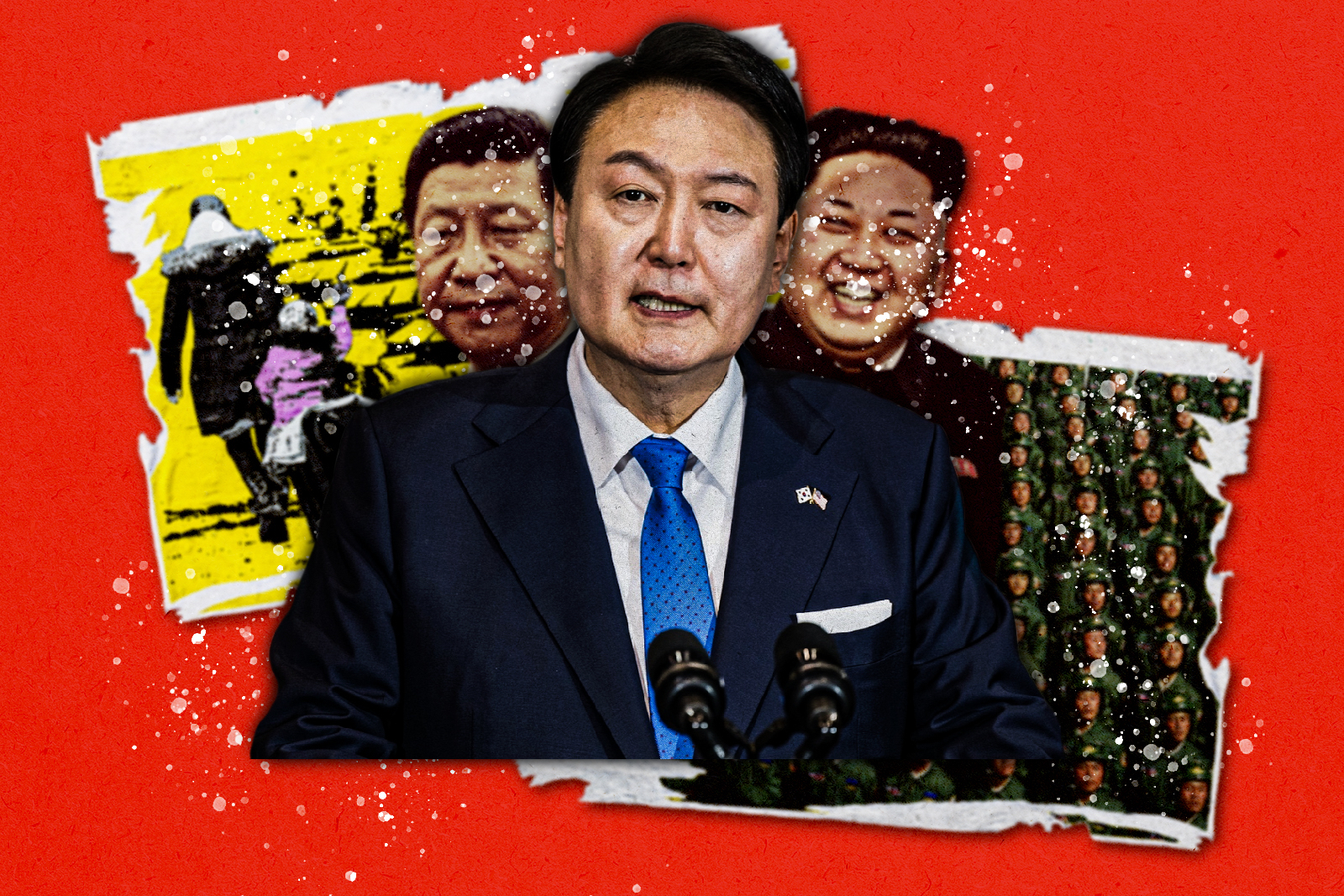
South Korea’s Ukraine War Gamble
The battlefields of Ukraine are not exclusive to Kyiv and Moscow. Behind the endless newsreels of burning Russian tanks, Ukrainian counteroffensives, and destroyed buildings lies a second hidden conflict. South Korea has quietly placed itself in the Ukraine war to confront North Korea and China. Seoul faces a tense security environment at home that affords little room for error in pushing back directly without risking unwanted blowback. Ukraine provides Seoul with a proxy to undermine Pyongyang and Beijing’s efforts to exploit the conflict and advance their interests, potentially deterring future provocations in Asia.
South Korea would prefer to concentrate on building its highly dynamic and innovative economy. Unfortunately, it shares a 160-mile land border with its perennial security threat. North Korea, whose leaders regularly threaten to reduce Seoul to a “sea of fire,” is a nuclear-armed spoiler for South Korea’s peace of mind.
South Korean President Yoon Suk Yeol pledged a hardline stance against Pyongyang’s threats in an annual white paper, setting the stage for Seoul’s eventual involvement in Ukraine. This July commemorated the 70th anniversary of the Armistice that froze the battle lines of the Korean War (1950-1953) at the 38th parallel, marking the point where both Koreas began the arduous journey of rebuilding their shattered nations. President Yoon drew a parallel with Kyiv’s present circumstances on his trip to Ukraine the same month, stating “The current situation facing Ukraine reminds us of the past situation of the Republic of Korea.” Seoul and Kyiv share the unique role of defending against wars fueled by Russia, China, and North Korea.
Largely sidelined and politically isolated, Pyongyang has sought to leverage the Ukraine war to gain prestige and extract concessions from Moscow. North Korea was the first country to recognize the Luhansk and Donetsk proxy states, publicly endorsed Russia’s invasion, and delivered 1,000 shipping containers of weapons to Russia.
Seoul has systematically countered every iota of North Korean support for Russia’s war effort by condemning the invasion, providing robust non-lethal military and humanitarian aid to Kyiv, and possibly even arming the Ukrainian military. In November 2022, the U.S. National Security Council announced Pyongyang covertly provided munitions to Russia through intermediaries which may have compelled Seoul to act. In 2022, Seoul’s arms exports jumped 140% to $17.3 billion, with most of these news sales going to Poland who borders Ukraine. Similarly, in March of this year, South Korea sold hundreds of thousands of artillery shells to Washington.
Of note, President Yoon has issued contradictory statements regarding military aid to Kyiv. In July, he announced plans to provide Ukraine with “large scale of military supplies,” without further elaboration while also claiming South Korea will not export lethal aid.
Seoul’s fierce opposition to North Korean arms sales is directly linked to denying potential concessions Pyongyang could obtain from Russian desperation. In September, U.S. intelligence officials suggested Russia might assist North Korea’s nuclear weapons development in exchange for badly needed munitions. In response, President Yoon gave a defiant speech at the United Nations General Assembly stating that “South Korea (and its allies) will not stand idly by” if North Korea receives Russian help on its nuclear weapons program.
Seoul can boast some successes in countering Pyongyang’s objectives in Ukraine. However, confronting China whose patronage sustains both Kim Jong-Un’s regime and the Ukraine war, has proven a much more delicate topic. China is the Korean Peninsula’s largest trade partner, placing Seoul in a dilemma. Seoul cannot speak too loudly against Beijing without risking additional economic bullying or cyber-attacks. For example, in 2016, South Korea suffered Chinese economic retaliation in response to Seoul’s decision to host a U.S. Terminal High Altitude Area Defense (THAAD) battery to protect against North Korean missile threats. Even after deepening security cooperation with Washington and Tokyo in September, Seoul remains exposed to China’s wrath.
Consequently, Seoul’s public discourse toward China sounds more like politely asking for favors when compared to its defiant tone struck with Pyongyang. Seoul has urged Beijing to press Moscow into ending the conflict and do something about North Korean nuclear weapons development. Beijing has not only ignored these requests, but it also teamed up with Moscow to signal displeasure for Seoul’s support for the Ukrainian war effort.
As recently as December 14th, the South Korean Air Force scrambled jets in response to a joint Chinese-Russian air patrol in Korean airspace, an unusual occurrence Seoul has reported several times since the onset of the Ukraine war. In September, South Korea’s National Intelligence Service announced Russia proposed including North Korea in its joint military exercises with China, drawing sharp criticism from Seoul. While largely symbolic, these actions indicate Beijing and Moscow are troubled by Seoul’s support for Ukraine which only proves it is having an impact. A failed Russian war effort would deeply trouble Beijing, particularly given its plans to invade the self-governing democratic island of Taiwan.
Constrained by its own geography, economy, and military South Korea has shrewdly played its hand in confronting its two main security challenges. Seoul recognizes its long-term security depends on deterring Pyongyang and Beijing from gaining the confidence to destabilize the Indo-Pacific region by undercutting their goals in Ukraine. Without firing a shot in anger, South Korea has accepted clear risks to its economy and sovereignty to do its part to ensure Pyongyang and Beijing clearly understand the costs of 21st-century warfare. We may all hope Seoul’s courageous efforts continue to pay dividends toward peace.
The author’s views and interpretations of fact are his own and not reflective of those held in whole or in part by the United States government.

